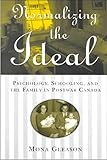Normalizing the Ideal : Psychology, Schooling, and the Family in Postwar Canada / Mona Gleason.
Material type: TextSeries: Studies in Gender and HistoryPublisher: Toronto : University of Toronto Press, [1999]Copyright date: ©1999Description: 1 online resource (224 p.)Content type:
TextSeries: Studies in Gender and HistoryPublisher: Toronto : University of Toronto Press, [1999]Copyright date: ©1999Description: 1 online resource (224 p.)Content type: - 9780802044792
- 9781442677760
- 306.85097109045
- HQ560 .G543 1999
- online - DeGruyter
| Item type | Current library | Call number | URL | Status | Notes | Barcode | |
|---|---|---|---|---|---|---|---|
 eBook
eBook
|
Biblioteca "Angelicum" Pont. Univ. S.Tommaso d'Aquino Nuvola online | online - DeGruyter (Browse shelf(Opens below)) | Online access | Not for loan (Accesso limitato) | Accesso per gli utenti autorizzati / Access for authorized users | (dgr)9781442677760 |
restricted access online access with authorization star
http://purl.org/coar/access_right/c_16ec
Homemaker mom, breadwinning dad who played hockey with his son on the weekends, one brother or sister, this was normal Canadian life in the fifties, right? Well, not quite, but author Mona Gleason argues that Canadian psychologists were in part responsible for this fiction of normalcy.Postwar insecurity about the stability of family life became a platform on which to elevate the role of psychologists in society. Moving outside the universities with radio shows and child-rearing manuals, these figures of authority changed the tenor of parental and familial concern from physical to mental health. Influential psychologists like Samuel Laycock and William Blatz spread their own vision of life as the healthy goal for which society should strive. Their ideal of 'normal' reflected and helped entrench the dominant white, Anglo-Celtic, patriarchal vision of life. Those who did not fit the model due to skin colour, class, or ethnicity were marginalized or silenced, and, as Gleason's innovative feminist approach emphasizes, whether male or female, simply trying to fit within the prescribed gender roles inevitably led to alienation.This history of psychology and its effects asks new and necessary questions about the role of the social sciences in shaping the private experiences of ordinary Canadians.
Mode of access: Internet via World Wide Web.
In English.
Description based on online resource; title from PDF title page (publisher's Web site, viewed 01. Nov 2023)


